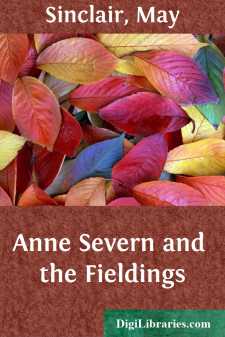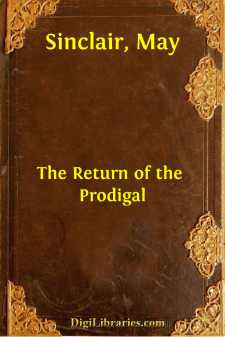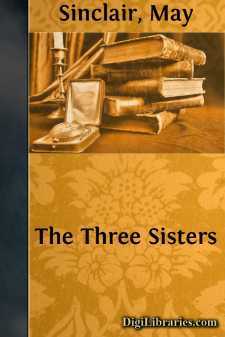Categories
- Antiques & Collectibles 13
- Architecture 36
- Art 48
- Bibles 22
- Biography & Autobiography 815
- Body, Mind & Spirit 144
- Business & Economics 28
- Children's Books 18
- Children's Fiction 14
- Computers 4
- Cooking 94
- Crafts & Hobbies 4
- Drama 346
- Education 58
- Family & Relationships 59
- Fiction 11833
- Games 19
- Gardening 17
- Health & Fitness 34
- History 1378
- House & Home 1
- Humor 147
- Juvenile Fiction 1873
- Juvenile Nonfiction 202
- Language Arts & Disciplines 89
- Law 16
- Literary Collections 686
- Literary Criticism 179
- Mathematics 13
- Medical 41
- Music 40
- Nature 179
- Non-Classifiable 1768
- Performing Arts 7
- Periodicals 1453
- Philosophy 65
- Photography 2
- Poetry 896
- Political Science 203
- Psychology 44
- Reference 154
- Religion 515
- Science 126
- Self-Help 85
- Social Science 82
- Sports & Recreation 34
- Study Aids 3
- Technology & Engineering 59
- Transportation 23
- Travel 463
- True Crime 29
May Sinclair
May Sinclair (1863-1946) was an influential British novelist and critic, renowned for her contributions to modernist literature. She is credited with coining the term "stream of consciousness" to describe a narrative technique that seeks to depict the multitudinous thoughts and feelings which pass through the mind. Sinclair's notable works include "The Life and Death of Harriett Frean" and "Mary Olivier: A Life," which explore themes of women's independence and psychological depth.
Author's Books:
Sort by:
by:
May Sinclair
CHAPTER I Everybody knew that Miss Audrey Craven was the original of "Laura," the heroine of Langley Wyndham's masterpiece. She first attracted the attention of that student of human nature at Oxford, at a dinner given by her guardian, the Dean of St. Benedict's, ostensibly in honour of the new Master of Lazarus, in reality for his ward's entertainment and instruction in the...
more...
by:
May Sinclair
I CHILDREN i Anne Severn had come again to the Fieldings. This time it was because her mother was dead. She hadn't been in the house five minutes before she asked "Where'sJerrold?" "Fancy," they said, "her remembering." And Jerrold had put his head in at the door and gone out again when he saw her there in her black frock; and somehow she had known he was afraid to...
more...
by:
May Sinclair
I 1 Barbara wished she would come back. For the last hour Fanny Waddington had kept on passing in and out of the room through the open door into the garden, bringing in tulips, white, pink, and red tulips, for the flowered Lowestoft bowls, hovering over them, caressing them with her delicate butterfly fingers, humming some sort of song to herself. The song mixes itself up with the Stores list Barbara...
more...
by:
May Sinclair
CHAPTER I Horace Jewdwine had made the most remarkable of his many remarkable discoveries. At least he thought he had. He could not be quite sure, which was his excuse for referring it to his cousin Lucia, whose instinct (he would not call it judgement) in these matters was infallible—strangely infallible for so young a girl. What, he wondered, would she say to Savage Keith Rickman? On Saturday, when...
more...
by:
May Sinclair
I They turned again at the end of the platform. The tail of her long, averted stare was conscious of him, of his big, tweed-suited body and its behaviour, squaring and swelling and tightening in its dignity, of its heavy swing to her shoulder as they turned. She could stave off the worst by not looking at him, by looking at other things, impersonal, innocent things; the bright, yellow, sharp gabled...
more...
by:
May Sinclair
INTRODUCTION When six months ago Mr. Thomas Seccombe suggested that I should write a short essay on "The Three Brontës" I agreed with some misgiving. Yet that deed was innocent compared with what I have done now; and, in any case, the series afforded the offender a certain shelter and protection. But to come out like this, into the open, with another Brontë book, seems not only a dangerous,...
more...
by:
May Sinclair
I "Stephen K. Lepper, Pork-Packing Prince, from Chicago, U. S. A., by White Star Line, for Liverpool." Such was the announcement with which the Chicago Central Advertiser made beautiful its list of arrivals and departures. It was not exactly a definition of him. To be sure, if you had caught sight of him anywhere down the sumptuous vista of the first-class sleeping-saloon of the New York and...
more...
by:
May Sinclair
T was Friday, the day he always came, if (so she safeguarded it) he was to come at all. They had left it that way in the beginning, that it should be open to him to come or not to come. They had not even settled that it should be Fridays, but it always was, the week-end being the only time when he could get away; the only time, he had explained to Agatha Verrall, when getting away excited no remark. He...
more...
by:
May Sinclair
I North of east, in the bottom, where the road drops from the High Moor, is the village of Garth in Garthdale. It crouches there with a crook of the dale behind and before it, between half-shut doors of the west and south. Under the mystery and terror of its solitude it crouches, like a beaten thing, cowering from its topmost roof to the bowed back of its stone bridge. It is the last village up...
more...
by:
May Sinclair
INTRODUCTION This is a "Journal of Impressions," and it is nothing more. It will not satisfy people who want accurate and substantial information about Belgium, or about the War, or about Field Ambulances and Hospital Work, and do not want to see any of these things "across a temperament." For the Solid Facts and the Great Events they must go to such books as Mr. E. A. Powell's...
more...











